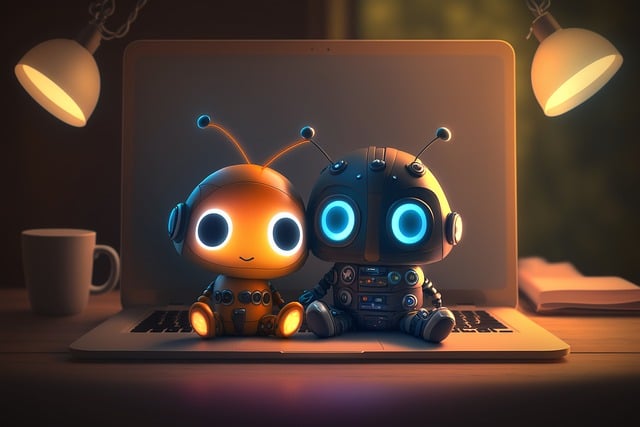
Jan 25, 2024
Introduction: Artificial Intelligence (AI) has emerged as a game-changer in work, revolutionizing industries and reshaping how we approach our professional lives. As we navigate the ever-evolving digital landscape, it is crucial to understand the impact of AI on the future of work. This article explores the transformative power of AI, providing factual insights and data-driven analysis to shed light on the subject.
The Rise of AI in the Workplace
The integration of AI technologies across various industries has witnessed a remarkable surge in recent years. From healthcare to finance, AI is transforming how we work, streamlining processes, enhancing productivity, and unlocking new avenues of opportunity. Let’s explore the specific sectors where AI is making a significant impact and uncover the benefits it brings.
AI has emerged as a powerful ally in the healthcare industry, revolutionizing patient care and diagnostics. AI can analyze vast amounts of medical data through advanced algorithms and machine learning, aiding in early disease detection, personalized treatment plans, and improved patient outcomes. For instance, AI-powered diagnostic systems have demonstrated remarkable accuracy in detecting certain types of cancer, reducing the chances of misdiagnosis and providing timely interventions.
AI is reshaping the landscape in finance by automating tasks that were once time-consuming and prone to errors. Intelligent algorithms can analyze market trends, predict stock prices, and optimize investment portfolios precisely. This enhances efficiency and empowers financial institutions and individuals to make informed decisions based on data-driven insights. Additionally, AI-powered chatbots strengthen customer service by providing instant support and personalized recommendations, revolutionizing how we interact with financial institutions.
The manufacturing industry has witnessed a paradigm shift with the integration of AI. Intelligent robots and automation systems streamline production processes, reduce costs, and enhance overall efficiency. AI-powered predictive maintenance systems can analyze machine data in real time, identifying potential faults before they escalate, thus reducing downtime and improving operational productivity. AI is transforming the manufacturing floor into a dynamic and efficient ecosystem by augmenting human workers with collaborative robots, known as cobots.
The retail industry is also experiencing the transformative power of AI. Through advanced analytics, AI can analyze customer preferences, predict buying patterns, and personalize shopping experiences. This enables retailers to offer targeted recommendations, optimize inventory management, and create personalized marketing campaigns. AI-powered virtual assistants are also becoming increasingly popular, providing customers instant support and customized recommendations, enhancing the overall shopping experience.
In conclusion, integrating AI technologies across industries has unleashed unprecedented potential, revolutionizing how we work. From healthcare to finance, manufacturing to retail, AI streamlines processes, enhances productivity and opens up new opportunities. By leveraging the power of AI, industries can unlock new levels of efficiency, accuracy, and innovation, paving the way for a brighter future of work.
Automation and Job Displacement
One of the primary concerns associated with the rise of Artificial Intelligence (AI) is its potential to replace human workers. However, examining the realities of automation and job displacement is crucial, separating fact from fiction. We aim to provide a nuanced perspective on this subject through meticulous data analysis and comprehensive case studies, shedding light on how AI technology can augment human capabilities rather than solely eliminate jobs.
The fear of job displacement stems from the belief that AI will render human workers obsolete. While it is true that specific tasks can be automated, it is essential to recognize that AI is not a complete replacement for human intelligence and creativity. AI can be seen as a powerful tool that complements human skills, allowing workers to become more efficient and productive in their roles.
Through automation, AI can take over repetitive and mundane tasks, freeing human workers to focus on higher-level responsibilities requiring critical thinking and problem-solving abilities. This shift in job roles allows individuals to utilize their unique human qualities, such as emotional intelligence, adaptability, and creativity, which are difficult to replicate with technology.
Furthermore, AI can potentially create entirely new job opportunities that were previously unimaginable. As AI technology develops, industries evolve, and new roles emerge. These roles often require individuals to work alongside AI systems, harnessing their capabilities to drive innovation and growth. This symbiotic relationship between humans and AI fosters a collaborative and dynamic work environment.
It is important to note that the impact of AI on job displacement varies across industries and job sectors. While some roles may decline due to automation, new positions will also emerge. The key lies in embracing the change and adapting to the evolving landscape. By continuously upskilling and reskilling the workforce, individuals can stay ahead of technological advancements and remain relevant in the job market.
In conclusion, the concerns surrounding automation and job displacement are valid, but it is essential to approach the topic with a balanced perspective. AI has the potential to enhance human capabilities, allowing individuals to focus on tasks that require uniquely human qualities. By embracing AI technology and continuously developing new skills, individuals can navigate the changing job market and thrive in the era of automation.
AI as a Collaborative Tool
Contrary to popular belief, Artificial Intelligence (AI) is not solely a threat to human workers. It can be a powerful collaborative tool that works alongside humans, amplifying productivity and driving innovation. By embracing AI technology, individuals can leverage its capabilities to enhance their skill sets and focus on higher-value tasks, increasing efficiency and success.
Traditionally, AI has been portrayed as a force that will replace human workers. However, this perception fails to acknowledge the potential for AI to complement and enhance human abilities. Rather than viewing AI as a threat, it is essential to recognize it as a tool that can augment human productivity and creativity, leading to a more symbiotic relationship between humans and machines.
AI technology can automate repetitive and mundane tasks, freeing up valuable time for humans to concentrate on complex and strategic activities. By offloading these routine tasks to AI, individuals can redirect their energy towards problem-solving, critical thinking, and decision-making processes. This collaboration between humans and AI allows for a more efficient allocation of resources and a greater focus on tasks that require uniquely human qualities, such as emotional intelligence and creativity.
Furthermore, AI can give individuals access to vast amounts of data and information, enabling them to make more informed decisions. By analyzing and interpreting complex data sets, AI can assist humans in identifying patterns, trends, and insights that may have otherwise gone unnoticed. This collaboration between humans and AI empowers individuals to make data-driven decisions and drive innovation within their respective fields.
Moreover, AI can be a valuable learning tool, providing individuals with personalized recommendations and insights based on their unique preferences and needs. Through machine learning algorithms, AI can curate relevant content and resources, helping individuals upskill and stay abreast of the latest industry developments. This collaborative approach to learning ensures that individuals are equipped with the knowledge and skills required to thrive in a rapidly evolving digital landscape.
In conclusion, the concept of AI as a collaborative tool is a powerful paradigm shift that challenges the notion of AI solely replacing human workers. By embracing AI technology, individuals can harness its capabilities to enhance their skill sets, focus on higher-value tasks, and drive innovation. This collaborative approach amplifies productivity and empowers individuals to leverage their unique human qualities, ultimately leading to increased success in the digital age.
The Future of Skills and Workforce Adaptability
As Artificial Intelligence (AI) continues to advance rapidly, the skills required in the job market are significantly transforming. Delving into the skills in high demand in the AI-driven future is essential, emphasizing the importance of continuous learning and adaptability. We aim to empower readers to future-proof their careers and remain competitive in this ever-changing landscape by providing actionable insights.
In the AI-driven future, there will be a greater emphasis on skills that complement and enhance the capabilities of AI technology. While technical skills such as data analysis, programming, and machine learning will undoubtedly be in high demand, developing a diverse set of uniquely human skills is equally crucial.
One of the critical skills that will be highly valued is emotional intelligence. As AI takes over routine and repetitive tasks, connecting with others on an emotional level becomes increasingly important. Skills such as empathy, communication, and collaboration will differentiate humans from machines, allowing individuals to build strong relationships and effectively navigate complex social interactions.
Critical thinking and problem-solving skills will also be essential in the AI-driven future. While AI can process vast amounts of data, humans possess the ability to think critically, analyze complex situations, and come up with creative solutions. These skills will be crucial in identifying opportunities, addressing challenges, and driving innovation in various industries.
Additionally, adaptability and a willingness to learn will be paramount in the AI-driven future. As technology evolves, individuals must be open to acquiring new skills and embracing change. Lifelong learning will become the norm, and individuals who continuously update their knowledge and adapt to new technologies will be better equipped to thrive in the job market.
To future-proof their careers, individuals must invest in continuous learning and development. This can be done through online courses, workshops, and other learning platforms that provide opportunities to acquire new skills and stay up-to-date with industry trends. It is also essential to seek mentorship and networking opportunities, as these can provide valuable insights and connections in the evolving job market.
In conclusion, the future of skills and workforce adaptability in the AI-driven era is an important consideration. By recognizing the unique human qualities that complement AI technology and emphasizing the development of emotional intelligence, critical thinking, problem-solving, adaptability, and a commitment to lifelong learning, individuals can future-proof their careers and remain competitive in the changing landscape. The key lies in embracing the opportunities presented by AI and continuously evolving one’s skill set to thrive in the digital age.
Ethical Considerations and Responsible AI
Integrating Artificial Intelligence (AI) in the workplace brings a host of ethical concerns that must be carefully considered. It is imperative to explore the importance of responsible AI implementation, considering issues such as bias, privacy, and transparency. Addressing these concerns head-on can pave the way for a responsible and inclusive AI future.
One of the primary ethical concerns surrounding AI is the potential for bias. AI systems are only as unbiased as the data they are trained on. If the data used to train AI models is biased or reflects societal prejudices, the AI system can inadvertently perpetuate and amplify those biases. Ensuring that the data used to train AI models is diverse, representative, and free from bias is crucial. Additionally, ongoing monitoring and evaluation of AI systems are necessary to detect and rectify biases as they arise.
Privacy is another significant ethical consideration in the age of AI. As AI systems process vast amounts of personal data, there is a need to establish robust data protection measures. It is essential to obtain informed consent from individuals whose data is being used and to ensure that data is stored securely and used only for its intended purpose. Transparent and user-friendly privacy policies outlining how data is collected, operated, and protected will build user trust.
Transparency is also a critical ethical consideration in AI implementation. Users should clearly understand how AI systems make decisions and recommendations. The inner workings of AI algorithms should be transparent and explainable to avoid the perception of a “black box” decision-making process. By providing transparency, individuals can better understand and trust the recommendations and decisions made by AI systems.
In addition to these concerns, a broader ethical framework for AI must be developed. This framework should address issues such as accountability, fairness, and the impact of AI on society at large. Responsible AI implementation requires collaboration between industry leaders, policymakers, and ethicists to establish guidelines and regulations that ensure the ethical use of AI technology.
In conclusion, ethical considerations are paramount as AI continues integrating into the workplace. Responsible AI implementation requires addressing bias, privacy, transparency, and broader societal impacts. By proactively tackling these ethical concerns, we can shape a fair, inclusive, and accountable AI future. With the proper moral framework, AI can enhance our lives and drive positive change while upholding the values essential to a just and equitable society.
AI and Human Decision-Making
While artificial intelligence (AI) can process vast amounts of data, human decision-making remains essential in the AI era. Examining the symbiotic relationship between AI and humans is crucial, highlighting how AI can augment decision-making processes by providing valuable insights and reducing biases.
AI technology can enhance human decision-making by analyzing complex data sets and identifying patterns and trends that may not be immediately apparent to humans. By leveraging machine learning algorithms, AI can process large volumes of information and generate actionable insights, enabling humans to make more informed decisions.
Moreover, AI can assist in reducing biases that may influence human decision-making. Human beings are inherently subjective, and biases can unconsciously influence our decisions. Conversely, AI is programmed to be objective and unbiased, as it relies on data and algorithms rather than personal beliefs or emotions. By incorporating AI into decision-making processes, we can mitigate the impact of human biases and make more impartial and fair choices.
However, it is essential to note that AI does not replace human decision-making. While AI can provide insights and reduce biases, it cannot fully understand human values, emotions, and context complexities. Human decision-making considers many factors, including ethical considerations, empathy, and intuition. These uniquely human qualities are essential in making decisions that align with societal values and individual needs.
The symbiotic relationship between AI and humans lies in their collaboration. AI technology can act as a tool that enhances human decision-making by providing data-driven insights and reducing biases. Humans, in turn, deliver the necessary context, values, and judgment to make decisions that consider a situation’s broader implications and nuances.
In industries such as healthcare, finance, and law, where decisions have significant consequences, AI can be particularly valuable. By analyzing vast amounts of data and identifying patterns, AI can support human experts in making accurate diagnoses, financial predictions, and legal decisions.
In conclusion, the relationship between AI and human decision-making involves collaboration and augmentation. While AI can process data and reduce biases, human decision-making remains essential for considering values, emotions, and context. By embracing the strengths of AI and human intelligence, we can harness the power of technology to make more informed and ethical decisions, ultimately driving positive change in a wide range of industries.
Conclusion
The AI future of work holds immense potential for transforming industries and empowering individuals. By embracing AI as a collaborative tool, adapting skills to the changing job market, and addressing ethical considerations, we can confidently navigate the AI-driven future. As we embark on this journey, it is crucial to stay informed, embrace change, and harness the power of AI to shape a better tomorrow.
Journey of Discovery: Fascinating Reads

Define Indoctrination: The Art of Subtle Brainwashing and Conditioning

The Statin Scam: Deadly Profits from a Pharmaceutical Deception

Copper Stocks: Buy, Flee, or Wait?

Dow 30 Stocks: Spot the Trend and Win Big

Coffee Lowers Diabetes Risk: Sip the Sizzling Brew

3D Printing Ideas: Revolutionize Your Imagination

Beetroot Benefits for Male Health: Unlocking Nature’s Vitality

Norse Pagan Religion, from Prayers to Viking-Style Warriors

Example of Out of the Box Thinking: How to Beat the Crowd

6 brilliant ways to build wealth after 40: Start Now

Describe Some of the Arguments That Supporters and Opponents of Wealth Tax Make

What is a Limit Order in Stocks: An In-Depth Exploration

Lone Wolf Mentality: The Ultimate Investor’s Edge

Wolf vs Sheep Mentality: Embrace the Hunt or Be the Prey



